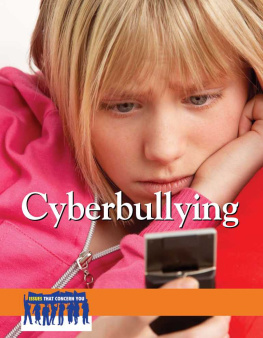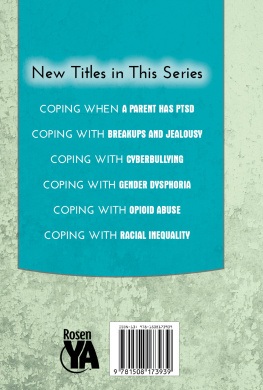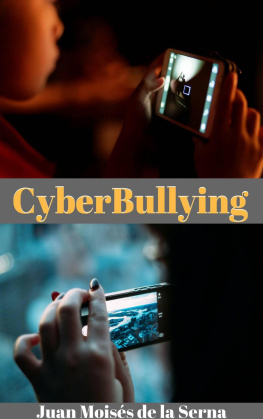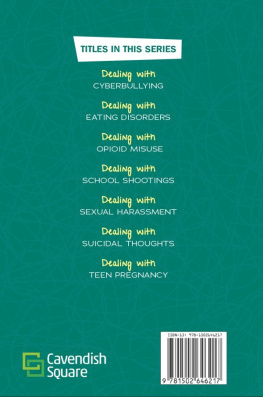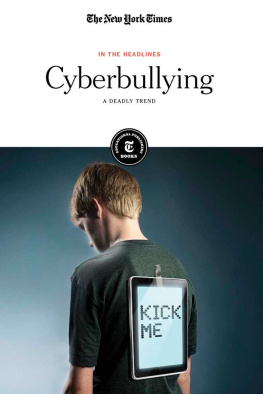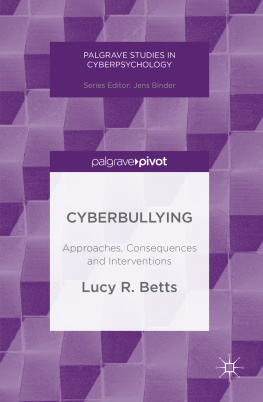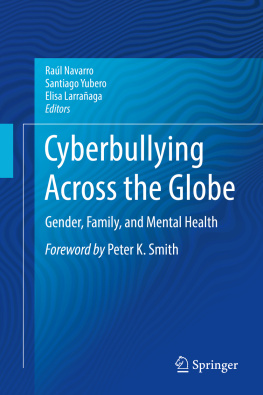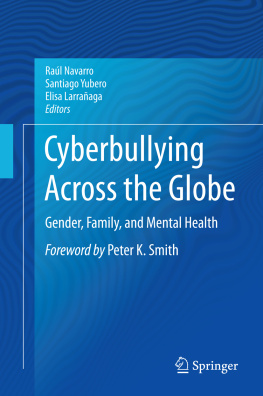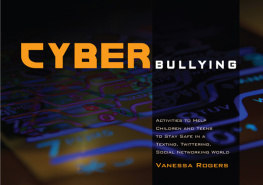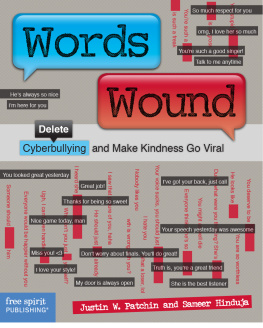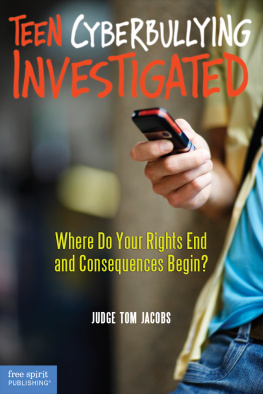- 1.Cyberbullying Is a Serious Problem
Ted Feinberg and Nicole Robey - 2.The Problem of Bullying Has Been Exaggerated
Beverly Flaxington, as told to Michael F. Shaughnessy - 3.Bullying Is Not a Rite of Passage for Youth
Michelle Obama and Barack Obama - 4.Cyberbullying Is Worse than Regular Bullying
Sarah Gibbard Cook - 5.Cyberbullying Should Be a Federal Crime
Lauren Barack - 6.Cyberbullying Should Not Be a Federal Crime
Louie Gohmert - 7.Criminalizing Cyberbullying Would Be Ineffective
Larry Downes - 8.Only Adults Who Bully Children Online ShouldBe Prosecuted
Berin Szoka - 9.New Laws Are Not Needed toCombat Cyberbullying
William Creeley - 10.Education Can Help Prevent Cyberbullying
Debbie Wasserman Schultz - 11.Schools and Parents Must Work Together toStop Cyberbullying
Emily Bazelon - Appendix
What You Should Know About Cyberbullying
What You Should Do About Cyberbullying
Elizabeth Des Chenes, Managing Editor
2012 Greenhaven Press, a part of Gale, Cengage Learning
Gale and Greenhaven Press are registered trademarks used herein under license.
For more information, contact:
Greenhaven Press 27500 Drake Rd.
Farmington Hills, MI 48331-3535
Or you can visit our Internet site at gale.cengage.com
ALL RIGHTS RESERVED.
No part of this work covered by the copyright herein may be reproduced, transmitted, stored, or used in any form or by any means graphic, electronic, or mechanical, including but not limited to photocopying, recording, scanning, digitizing, taping, Web distribution, information networks, or information storage and retrieval systems, except as permitted under Section 107 or 108 of the 1976 United States Copyright Act, without the prior written permission of the publisher.
For product information and technology assistance, contact us at Gale Customer Support, 1-800-877-4253
For permission to use material from this text or product, submit all requests online at www.cengage.com/permissions
Further permissions questions can be e-mailed to
Articles in Greenhaven Press anthologies are often edited for length to meet page requirements. In addition, original titles of these works are changed to clearly present the main thesis and to explicitly indicate the author's opinion. Every effort is made to ensure that Greenhaven Press accurately reflects the original intent of the authors. Every effort has been made to trace the owners of copyrighted material.
Cover image MBI/Alamy
LIBRARY OF CONGRESS CATALOGING-IN-PUBLICATION DATA
Cyberbullying / Tamara L. Roleff, book editor. p. cm. -- (Issues that concern you)
Includes bibliographical references and index.
ISBN 978-0-7377-5692-0 (hardcover)
1. Cyberbullying. I. Roleff, Tamara L., 1959-HV6773.15.C92C934 2012 302.34'302854678--dc23
2011040126
Printed in the United States of America 1 2 3 4 5 6 7 16 15 14 13 12
CONTENTS
1.Cyberbullying Is a Serious Problem
Ted Feinberg and Nicole Robey
2.The Problem of Bullying Has Been Exaggerated
Beverly Flaxington, as told to Michael F. Shaughnessy
3.Bullying Is Not a Rite of Passage for Youth
Michelle Obama and Barack Obama
4.Cyberbullying Is Worse than Regular Bullying
Sarah Gibbard Cook
5.Cyberbullying Should Be a Federal Crime
Lauren Barack
6.Cyberbullying Should Not Be a Federal Crime
Louie Gohmert
7.Criminalizing Cyberbullying Would Be Ineffective
Larry Downes
8.Only Adults Who Bully Children Online ShouldBe Prosecuted
Berin Szoka
9.New Laws Are Not Needed toCombat Cyberbullying
William Creeley
10.Education Can Help Prevent Cyberbullying
Debbie Wasserman Schultz
11.Schools and Parents Must Work Together toStop Cyberbullying
Emily Bazelon
Appendix
What You Should Know About Cyberbullying
What You Should Do About Cyberbullying
T yler Clementi was an eighteen-year-old freshman at Rutgers University in New Jersey and a talented violinist in the school orchestra. Clementi was also gayalthough not openly so. One night in late September 2010, Clementi asked his roommate, Dharun Ravi, for privacy. Ravi went into a friends room next door and remotely started up the webcam in his and Tylers room. Then Ravi and his friend watched and streamed live video of Clementi having intimate relations with another man in his dorm room. Clementi found out about it and complained to his resident assistant and other school officials. Two nights later, Clementi again asked for privacy in his dorm room, and once again Ravi streamed the video live over the Internet. The next day, without telling anyone of his despair, Clementi drove an hour to the George Washington Bridge in New York City and jumped to his death.
Gay Teen Suicides
Clementi is just one of several gay teens who have committed suicide after being cyberbullied. In fact, four other teens killed themselves within a month of Tyler Clementis suicide after being cyberbullied because they were gay. Asher Brown, thirteen, of Houston, shot himself in the head after enduring constant harassment at school because of his small size, his religion, and for being perceived as gay. (On the morning of his death, he told his father he was, indeed, gay.) Billy Lucas, fifteen, of Greensburg, Indiana, hanged himself in his familys barn after being constantly bullied and harassed because his classmates thought he was gay. (Billy had never told anyone whether or not he was gay.) Seth Walsh, thirteen, of Tehachapi, California, hanged himself from a tree in his backyard after being tormented over a long period of time for being gay. Seth was found before he died and was taken to a hospital, where he lived on life support for ten days before he finally died. Raymond Chase, nineteen, an openly gay sophomore at Johnson and Wales College of Culinary Arts in Rhode Island, was the fourth teenager who killed himself within a month of Clementis suicide. Chase hanged himself in his dorm room after being bullied for being gay.
A Cyberbullying Survey of Gay Teens
Researchers and social scientists claim that as more and more of the nation and the world becomes connected online, cyberbul-lying is increasing. According to a 2009 online survey on cyber-bullying and gay youth, lead author Warren Blumenfeld says that one out of every two lesbian, gay, bisexual, and transgender (LGBT) youths (54 percent) are regular victims of cyberbullying. Blumenfelds online survey found that 45 percent of the LGBT youth felt depressed, 38 percent were embarrassed by the cyberbullying, and 28 percent were anxious about going to school. More than one quarter of them had suicidal thoughts. Theres a saying that weve now changed to read, Sticks and stones can break my bones, but words can kill, Blumenfeld said in a press release about his study. Especially at this age, this is a time when peer influences are paramount in a young persons life, he continued. If one is ostracized and attacked, that can have devastating consequencesnot only physically, but on their emotional health for the rest of their lives. The teens also believed that there was little they, their parents, or school officials could do to stop the bullying. Blumenfeld said, They feared that there might be more retribution by tattling.1
Next page
